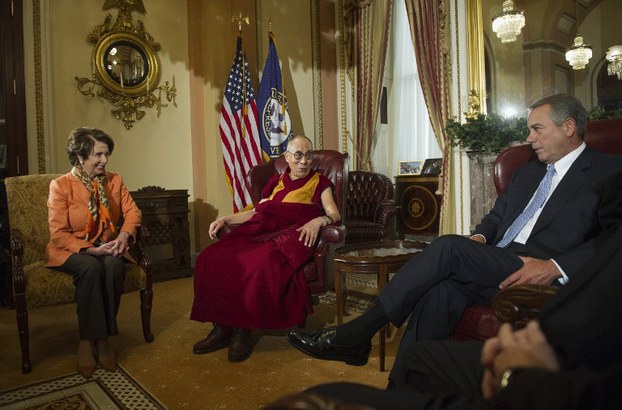




The Dalai Lama met in Washington today with U.S. lawmakers, opening a meeting of the Senate with a prayer and speaking afterward with senior congressional leaders who voiced strong bipartisan support for the exiled spiritual leader.
The meeting came almost two weeks after China opposed a White House meeting with President Barack Obama, who also pledged strong U.S. support for Tibetan traditions and human rights seen as threatened by Beijing’s rule.
“What is happening in Tibet is a challenge to the conscience of the world,” House of Representatives Democratic Leader Nancy Pelosi said in welcoming the Dalai Lama Thursday morning.
“Thank you for your leadership in guiding us through it.”
Religious freedom
House Republican Speaker John Boehner meanwhile expressed “pleasure” in welcoming the Dalai Lama to the United States Capitol.
“His fight for religious freedom and tolerance has always brought Congress together in a bipartisan fashion,” Boehner said, adding, “It’s our pleasure to have him today to continue those conversations and to show him our support.”
The Dalai Lama fled into exile in 1959 following a failed national uprising against Chinese occupation and is reviled today by China’s leaders as a dangerous separatist intent on “splitting” Tibet from Beijing’s rule.
He insists, though, that he wants only a “genuine autonomy” for Tibet that will preserve the Himalayan region’s environment, language, and cultural and religious traditions while remaining a part of China.
'Pure mind'
Opening a Senate session for the first time with a prayer, the Dalai Lama told his listeners, “With our thoughts, we make our world … Speak or act with a pure mind and happiness will follow you like a shadow that never leaves.”
The Senate often has guest chaplains offer the opening prayer.
The Dalai Lama also urged greater U.S. “self confidence” in asserting the values of democracy and freedom around the world, Agence France-Presse reported.
“These traditional values are, I think, very, very relevant in today’s world. After all, you are the leading nation in the free world. So, [show] self-confidence,” the Dalai Lama said.
Tibetans have held sporadic demonstrations against human rights abuses by Chinese authorities and challenging Beijing’s rule in Tibetan areas since widespread protests swept the region in 2008.
A total of 127 Tibetans have also set themselves ablaze in self-immolation protests calling for Tibetan freedom and demanding the Dalai Lama’s return, with another six setting fire to themselves in India and Nepal.